ZombiePie's Games Of The Decade Superlatives - Part II
By ZombiePie 8 Comments
Preamble
Hello there dear reader! Here's the second, and final part of my "Game of the Decade" series. For those who may have missed the first episode, give it a read using the link below! Also, be aware, my approach to the whole "Game of the Decade" gimmick is a bit unorthodox. Instead of systematically ranking my favorite games from the 2010s, I'm handing out "superlatives" to what I think are the notable moments and events of the decade. Undoubtedly, there's a decent amount of "wiggle room" when it comes to several of my awards. So, please keep that in mind, and if you can think of a game that is more deserving of any of my personal choices, feel free to drop a comment.
Best Meme Game - Moonbase Alpha
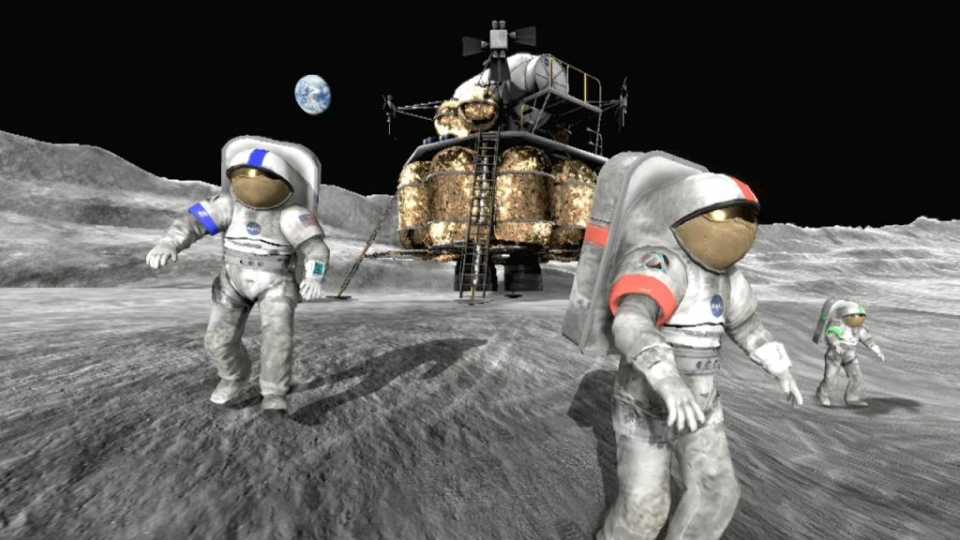
I miss the internet of yesteryear. Sure, the internet of today is faster and more diverse than what it was ten years ago, but that doesn't stop me from being nostalgic. I long for the days when the top sites on the World Wide Web were Geocities, Ebaumsworld, Newgrounds, AlbinoBlackSheep, and Myspace. I miss the pure anarchy of "Web 2.0" before it became weaponized by fascistic regimes or racist scumbags. I miss when "viral videos" were stupid shit that made no sense instead of vain attempts at internet glory. And you know what? Moonbase Alpha is a video game that encapsulates those heady days perfectly.
There's not a single video game that speaks to the early-phases of the 2010s "internet boundary setting" quite like Moonbase Alpha. An ACTUAL educational tool from NASA becoming "famous" because a bunch of random bozos recorded themselves saying random nonsense, speaks to a more "pure" era of the internet. You didn't see someone from Moonbase Alpha go on to promote their podcast, which had two to three-minute advertisements for dick pills. Instead, Moonbase Alpha was a fun playground where everyone shouted "John Madden" while attempting to survive the inhospitable surface of the moon. That's not to say people did not exploit the anonymity they enjoyed while playing Moonbase Alpha. Nonetheless, you were more likely to hear someone spout quotes from Metal Gear Solid than homophobic slurs.
Runner-up: Goat Simulator
There's a lot one can say about the "legacy" of Goat Simulator, and not all of it is positive. While, yes, the game provided a handful of cheap thrills, there was an associated cost to that. It gave rise to a handful of early YouTube and Twitch influencers and all but paved the way for the glut of parody simulation games we have to deal with today. Nonetheless, the mixed legacy of Goat Simulator, if anything, speaks volumes of the decade that was the 2010s.
Most Catastrophically Ill-advised Piece Of Hardware - uDraw GameTablet

I know the Kinect seems like the heir apparent for this award. However, many forget how successful the Kinect was on the Xbox 360. While most, myself included, would argue the accessory never controlled particularly well, it was popular enough with children and families that it enjoyed a relatively long lifespan. The Kinect on the Xbox One is a different, but also surprisingly positive story. Yes, the addition vaulted Microsoft down a dark path that initially hampered their reputation, but they have remarkably turned things around. Likewise, Microsoft released a non-gaming version of the device, and it continues to have value among medical professionals.
The uDraw GameTablet, on the other hand, bankrupted an entire video game publisher and drove hundreds into unemployment. The device resulted in THQ netting a loss of around $100 million. Furthermore, THQ's demise was, in many ways, the death knell of the "B-Tier" game. With indie games already cutting into it's bottom-line, THQ betting hard on the success of the uDraw Tablet proved to be one of the most disastrous financial decisions within the video game industry during the 2010s. What was once a rival to Activision quickly became a carcass picked apart by vultures in bankruptcy court. It was a sad fate but also a reminder of the brutality of the video game industry.
Runner-up: Xbox One Kinect
Even with my previous statements defending the Kinect, there's no denying the piece of hardware had an overall negative impact on the Xbox One's prospects. It was an unreliable and frustrating device that drove up the price of the Xbox One at the time of its release. It played a massive role in the ousting of Don Mattrick as well as the rise of Phil Spencer, who eventually helped the brand rediscover its identity.
Hey, Mobile Games Are Still A Threat - Clash of Clans

I honestly had a difficult time with this category. On the one hand, Clash of Clans enjoyed global ubiquity, andits profit model continues to influence the design of AAA games. On the other hand, Fate/Grand Order was the "final nail in the coffin" in shifting the majority of Japan's game studios towards mobile game development. I eventually went with the former rather than the latter because of a point I brought up on my previous blog. We are entering the 2020s still unclear as to which micro-transactions "get a pass," and which ones qualify as gambling. Much of that uncertainty originates from Clash of Clans.
Just as a fun case study, I want you to think about the last multiplayer-focused video game you played. Next, I want you to answer if it had a one-time use consumable that would "boost" the performance of your character. Regardless if you can pay for those consumables or not, you are playing a game influenced by Clash of Clans. Yes, Clash of Clans wasn't the first mobile game to feature micro-transactions, but games like Candy Crush or Angry Birds didn't permeate into the fabric of AAA game development as Clash of Clans did. The result is, by hook or by crook, some part of Clash of Clans will continue to follow us throughout the 2020s and possibly further. Unless by pure happenstance, another mobile game finds an even more exploitative manner in which to squeeze money out of consumers, Clash of Clans is the video game cockroach that will refuse to die.
Runner-up: Fate/Grand Order
$236,495,616. That's the amount of revenue Fate/Grand Order generated in 2019 ALONE! It was the highest-grossing game in Japan by a country mile as the second-place game, Dragon Ball Z Dokkan Battle, generated LESS THAN HALF of that. Numbers aside, Fate/Grand Order has a dubious legacy, much like Clash of Clans. If you have been listening to the 8-4 Podcast, then you'd know large swaths of Japanese game development is converting en masse to churn out gacha games much in the style of Grand Order. With signs that the appeal of these games is starting to wane, it's a scary bubble I can only assume will pop within the next decade.
Most Revelatory Moment - Fez
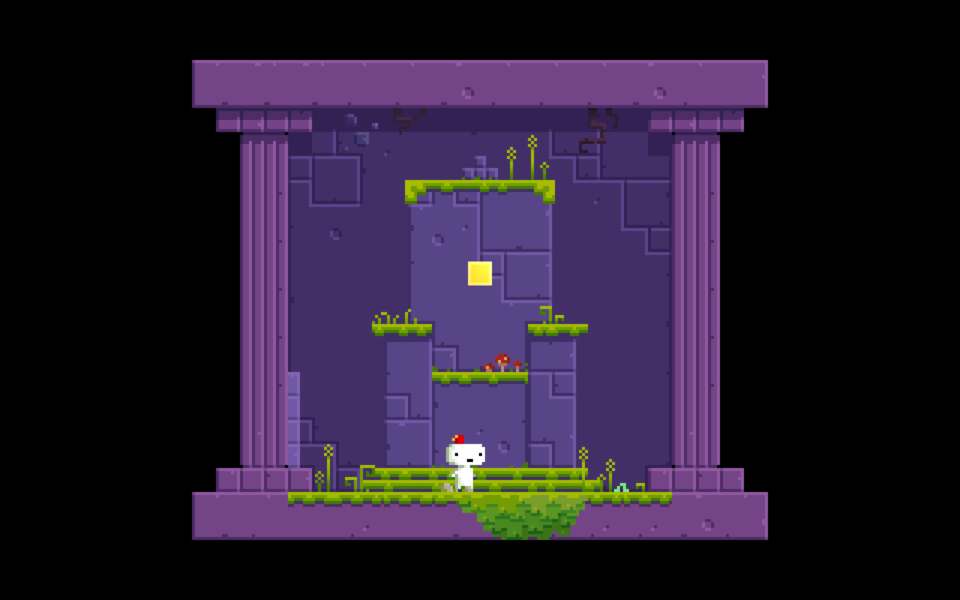
Crowing a "most revelatory moment" is a bit tricky. Much like life itself, your mileage may vary, but with Fez, its bait-and-switch deserves some commendation. In that regard, I maintain that deciphering Fez's secret language is a proverbial "Inverted Castle Moment," but for a new generation of gamers. No other video game drove players to explore their surroundings more than Fez. For literal YEARS people scoured the game hoping to uncover a new secret, and to that extent, a new meaning to what they were playing. For the most part, these investigative efforts proved to be nothing more than navel-gazing. Nonetheless, Fez inspired people to reconsider their previous interactions with the game and try again at every puzzle.
Figuring out the "secret" in Fez is unique in other regards. Suddenly, you realize your relationship with the game runs deeper than you'd initially thought. It shifts your perspective and forces you to understand the random etchings of graffiti in the world are so much more than that. Moreover, the world becomes alive, and whole levels become portals to life-altering experiential moments. The game shifts away from being a fun little indie platformer to that of a mysterious archeological expedition. It was an incredibly impactful moment way back in 2012, and it's a revelation I believe will hold up for years to come.
Runner-up: Doki Doki Literature Club
The twist in Doki Doki Literature Club is far more nefarious than Fez's. While Fez slowly builds up a sense of mystery, DDLC jump-starts its wild trek into insanity at the drop of a hat. That said, DDLC still deserves credit for shocking audiences and causing them to question their limits, especially when playing otherwise innocuous visual novels.
Most Important Translation - Recettear: An Item Shop's Tale
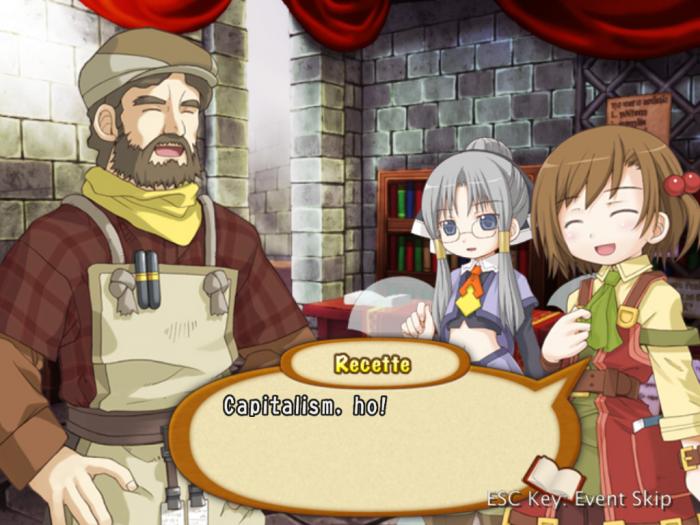
So, let's set the scene: Recettear: An Item Shop's Tale originally came out in Japan way back in 2007. Aspiring game developers, Andrew Dice and Robin Light-Williams, who met on the Something Awful forums, encountered the game during a trip to Japan. After putting the game through its paces, they decided to have a go at localizing it for Western audiences. Neither of them had any professional experience with translation, let alone game development. However, on a wing and a prayer, they contacted the developer with an offer to translate the game into English at a below-market rate. To their surprise, EasyGameStation, the developer, took them up on their offer.
What ensued next were two friends, miles apart from each other, spending months of their lives translating a game many at the time considered too niche for North America and Europe. On top of that, the game featured numerous idioms and idiosyncrasies that would only make sense to a Japanese audience. Dice and Light-Williams, however, were strong supporters of Ted Woolsey and viewed such language as a fun challenge. Hence, why "Capitalism HO!" is a thing some on the internet enjoy repeating. Finally, when it came to publishing the game, it exceeded everyone's expectations. Not only did the game sell well on every platform it launched on, but it also paved the way for more doujinshi games to release on Steam and other digital marketplaces.
Runner-up: Hatsune Miku: Project DIVA F
Alright, this runner-up is NOT WHAT YOU'RE LOOKING FOR, but that doesn't mean it's not essential to video game history. Project DIVA F wasn't merely the first game in the series to be multi-platform. It created an easy template for other J-Pop rhythm games to follow for localization purposes. Had it not been for Project DIVA F, DOZENS of Japanese-styled rhythm games would not have seen the light of day outside of Japan. For that, I tip my hat to Hatsune Miku.
Greatest Comeback Story - Final Fantasy XIV: A Realm Reborn
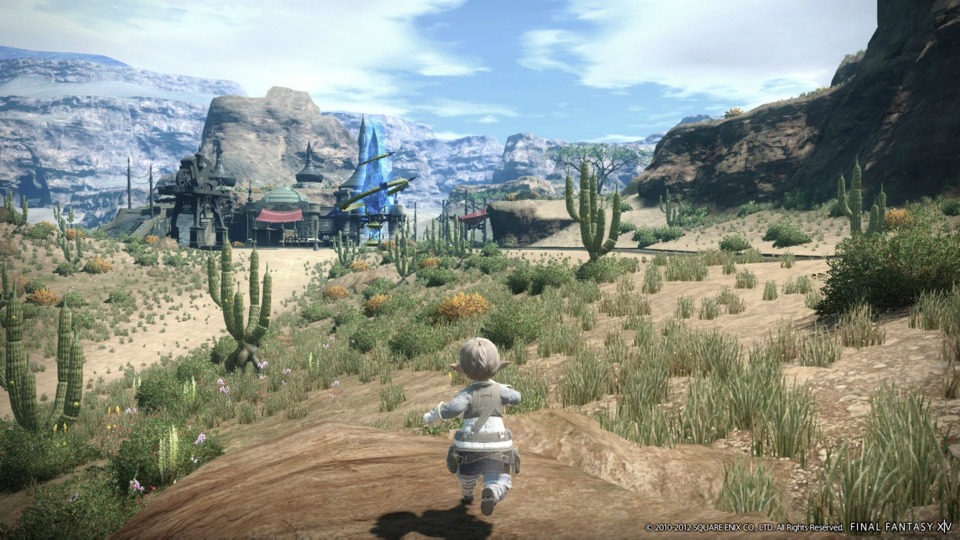
Fuck it, Final Fantasy XIV Online: A Realm Reborn isn't merely the greatest comeback story of the decade, it's the greatest comeback story in the entire history of video games. When Final Fantasy XIV first released in 2010, audiences panned the game across the board. The UI was clunky; the world was a fucking nightmare to navigate; the loot-grind feedback loop was atrocious; the game engine was ill-suited for an MMO; overall, the game was a bad time through and through. And yet, Square-Enix held on and, after a significant leadership change, embarked on the Herculean task of rebuilding the game. It wasn't an immediate change of scenery, and some fans of Final Fantasy XIV forget the game was virtually free to play for a whole year, but one that shook the entire video game industry to its core.
Most of the credit for this turnaround goes to Naoki Yoshida, who did everything right when he was given free rein to rebuild Final Fantasy XIV. Right from the get-go, he increased transparency and embarked on a significant effort to restore goodwill with the game's player base. But the man's unorthodox approach to MMORPG design shouldn't be ignored either. Not only does the game appeal to veteran MMORPG players with its in-depth content and customizability options, but it's also one of the more accessible MMORPGs for newcomers. The game features the most seamless keyboard-to-controller options I have ever seen, and it does not require the massive time sink one normally associates with this genre. The rise and fall and rise again of Final Fantasy XIV is by far one of the greatest "feel good" stories of the 2010s, and I'm grateful things worked out for the game.
Runner-up: No Man's Sky
As I mentioned on my last blog, I wholeheartedly admit No Man's Sky is still a far cry away from what it promised in 2014. Nonetheless, a lot of credit should go to Sean Murray and Hello Games for remaining committed to improving No Man's Sky before the end of the decade. And, for the most part, their efforts worked. The Atlas Rises update transformed No Man's Sky into something most players can get behind. For example, its murder-mystery inspired third act provides some of the best science-fiction writing of the decade.
Best Use Of Licensed Music - Hotline Miami
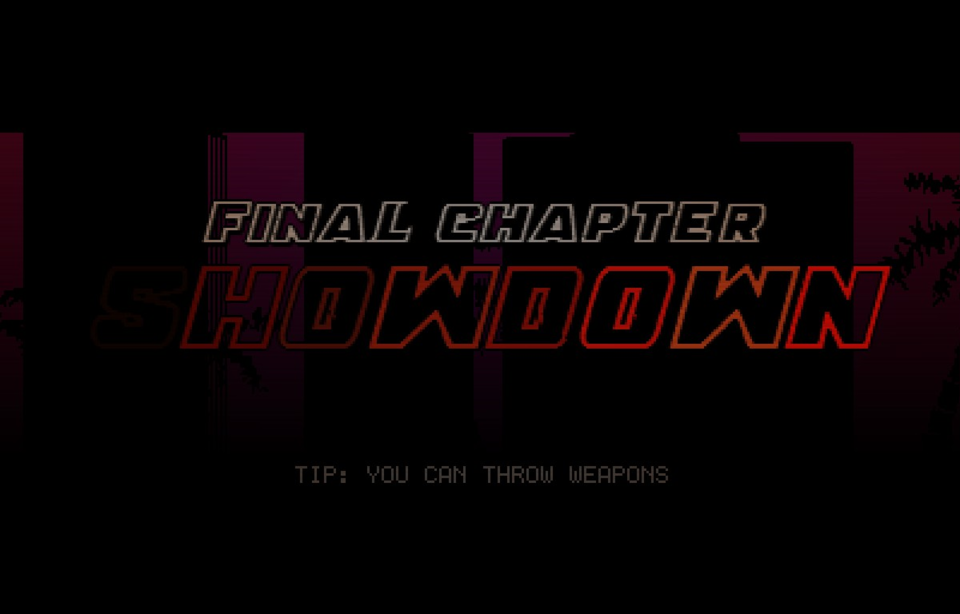
Licensed soundtracks often go ignored with video game fans. We place a rightfully higher value to game studios who take the time to craft original soundtracks. However, Hotline Miami proved that licensed soundtracks have their advantages as well. When it comes to games that use their music to support a robust aesthetic choice, no game comes to mind as immediately as Hotline Miami. The game's primarily licensed soundtrack did almost as much to compliment the game's psychedelic feel as its graphics. Often while playing it, you found yourself moving in the world to the beat of the music. Or, the throbbing drops would perfectly juxtapose to the brutal violence you were witnessing on your screen.
Additionally, it's important to note how Hotline Miami served as many people's first introduction to modern synthwave. While, yes, everyone has seen those endless synthwave video streams trending on YouTube, Hotline Miami still played a significant role in making this musical sub-genre trendy with mainstream audiences. Previously niche musical acts, such as Sun Araw and M|O|O|N, became widely talked about names thanks in part to their inclusion in Hotline Miami's OST. To suggest one particular video game played a role in the explosion of 1980s styled electronic music would be ridiculous. Nonetheless, Hotline Miami spawned dozens of clones, which furthered the genre's growth even more.
Runner-up: Saints Row: The Third
Saints Row: The Third took a more straightforward approach to its licensed soundtrack. Obviously, as a GTA-styled clone, it has the expected assortment of radio stations. However, what makes Saints Row: The Third more noteworthy is its use of licensed music to reinforce story set pieces. The most notable examples include parachuting to a party to the tune of Kayne's "Power" and racing to save Shaundi while Bonnie Tyler's "Holding Out for a Hero" blares in the background.
Best Use Of Couch Co-Op - Portal 2
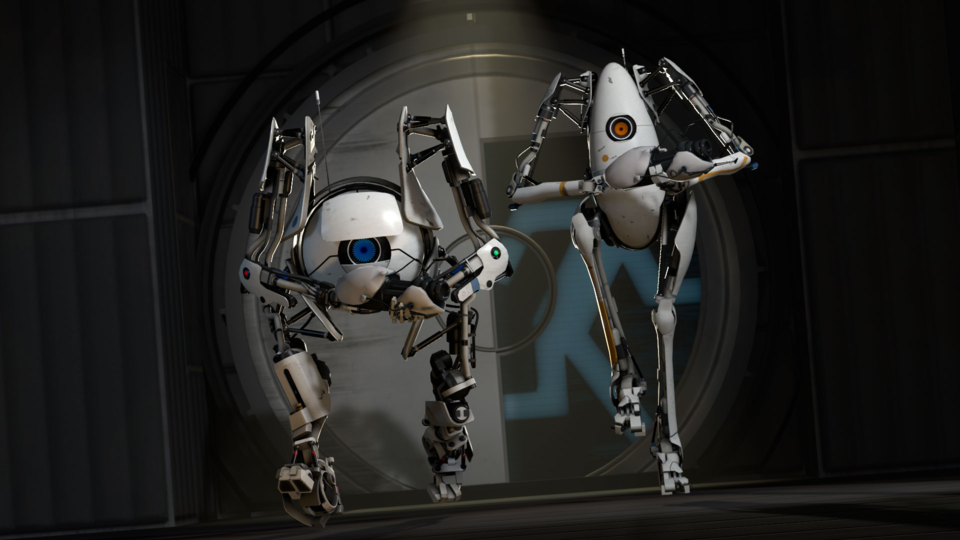
The 2010s were not kind to couch co-op. What was once an almost default feature has quickly become a luxury item. Today, games that do have local cooperative modes are usually ones that go out of their way to provide that experience from the get-go, with Josef Fares' A Way Out being a notable example. Portal 2 found itself at a happy medium between the split-screen co-op of yesteryear and the carefully crafted co-op modes of today. Certainly, the game can still be enjoyed as a solo experience as its single-player campaign provides great thrills and compelling storytelling set pieces. However, its cooperative mode is a genuinely unique experience worth seeing for yourself.
Part of what makes Portal 2's co-op so memorable is its robotic characters, Atlas and P-body. The couple is entirely adorable as they navigate one hazardous obstacle course after another. On top of that, their adventure feels anything but "tacked on." Their interactions with GLaDOS and other Portal 2 standbys do a lot to fill in the game's storytelling gaps. Moreover, because your interactions with them require you to be next to another person, that sense of discovery as you progress throughout the game feels more genuine. Needing to deduce the conceit of puzzles with a partner provides opportunities to bond, and that's an experience one shouldn't dismiss.
Runner-up: Rocket League
Rocket League provides pure unadulterated fun for gaming groups. Even if you are awful at pulling off tricks or aerial maneuvers, you'd be hard-pressed say it isn't a fun time. Furthermore, Rocket League was accessible to non-gamers and helped address equity with non-traditional social groups. Anyone could pick up a controller and have a fun time with the game, and that's a rarity even today.
Game That Most Deserves Credit For Pioneering A Genre - Dark Souls

What more can be said about Dark Souls' legacy that hasn't already been said? Right off the bat, I am aware that Dark Souls wasn't the "first" game to play around with its mechanics, and other games like Demon's Souls laid the groundwork for its meteoric rise. But in the end, when a game has recurring death, a hard as nails difficulty scale, and an open-world format, we don't compare them to Demon's Souls. No, we refer to them in comparison to Dark Souls because that's the game that put all of the pieces of the "Souls Formula" into a single compelling package. More importantly, Dark Souls innervated standard environmental worldbuilding and encouraged action-adventure games to throw out everything they knew about play-testing. Upon its release, Dark Souls was broken, buggy, and downright frustrating to play. And yet, that made the game even more iconic.
What continues to resonate with me is how seamlessly the different worlds and levels transition to one another. Every connection that led to another area felt like a natural progression. Sure, they were often cleverly disguised loading screens, but that didn't matter in the grand scheme of things. And in terms of storytelling, Dark Souls proved that you did not need to have big flashy cutscenes to establish a game's mood and tone. The lands you explore in Dark Souls are cursed, but also teeming with a diverse ecosystem. Unlike other games from the 2010s, I can name specific levels from Dark Souls without the help of Google.
Runner-up: PlayerUnknown's Battlegrounds
PlayerUnknown's Battlegrounds is another game that needs no introduction. Its online multiplayer battle royale mode has become a staple with virtually all multiplayer-focused video games. It was the game that shifted gamers and studios away from your usual mix of deathmatch and team deathmatch.
Weirdest Crossover That Works - Tokyo Mirage Sessions ♯FE
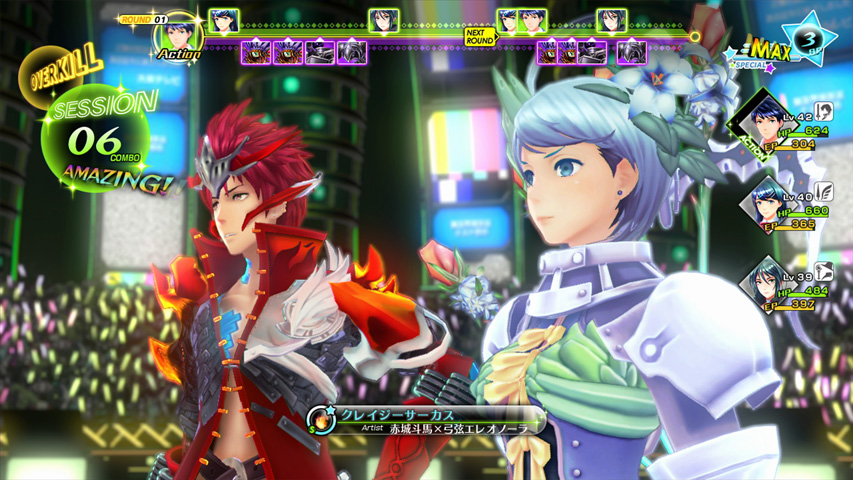
Of my many categories, this award is the one I admit courts the highest degree of subjectivity. Undoubtedly, what is "weird" to one person is the norm to another. Nonetheless, Tokyo Mirage Sessions ♯FE feels like a game only possible in the dark world of fan-fiction. Only a mad scientist would want to combine the harebrained insanity of Shin Megami Tensei with the boilerplate strategy and dating sim framework of Fire Emblem. Nevertheless, Tokyo Mirage Sessions does precisely that, and it "works." Somehow, it blends the straightforward mechanics of Fire Emblem with the style of Shin Megami Tensei
PERFECTLY!
I want to put extra emphasis on Tokyo Mirage Sessions' sense of style. The game's use of J-Pop and musical numbers lends to a colorful journey populated by neon-drenched backdrops. All the while, you are graced with a cast of memorable, albeit trope heavy, characters that eventually make their way into your heart. It's a game that shouldn't work, but somehow, probably by the brute force of its charm, does. Thankfully, the game has gotten a much-deserved second wind following its release on the Nintendo Switch. Which, by the way, I strongly recommend to anyone seeking a compelling JRPG experience!
Runner-up: Pokémon Conquest
God DAMN! What I would do for another Pokémon Conquest game! And before you laugh, Pokémon Conquest was fun and way more in-depth than anyone could have predicted. No doubt, it was a wacky game, but that did impede it from being a memorable experience I think worthy of a sequel.
The "Holy Shit, That's Right, That Came Out" Award - Duke Nukem Forever

I can only imagine an alternate universe where Duke Nukem Forever was heralded as a monumental accomplishment in game development. If we are honest, part of me wishes Duke Nukem Forever never came out in 2011. It was far more enjoyable as both an industry-wide joke as well as a cautionary tale on the pitfalls of game development. Had that been the case, you and I could have told our children's children what Duke Nukem Forever looked like back our day as the game's release continued to be talked about in hushed tones. Instead, we have this shitty game. A shitty game, mind you, that does very little of note and avoids being so bad it's "good."
It's honestly offensive how boring Duke Nukem Forever ended up being. If the game was going to be awful, it should have attempted to be the worst thing since Superman 64. Instead, it's a plodding tram-ride tour of over twenty years of first-person shooter design. Parts and pieces of it reek of outdated game design, and not in a positive way. The result is what was once a major talking point among gamers, becoming a forgotten memory. Now that Duke Nukem Forever has come out, no one talks about it anymore. Seriously, did any of you know the game ended up getting THREE DLC packages?!
Runner-up: Postal III
Never before have I seen a game so desperately try to court "outrage culture" as pitifully as Postal III. The first two Postal games were reported across the usual sources of news media. They crossed several cultural boundaries and pushed the limits of "good taste" for better or worse. At any rate, Postal III was a nightmare most people pretend never happened. As Ryan Davis once put it, "You've kinda shown your hand Postal III; you are fucked up, unfinished, and not goddamn funny at all!"
Most Tragic Example Of A Video Game Killing A Franchise - Mass Effect: Andromeda
We now end this blog with the ultimate bummer of the 2010s: Mass Effect: Andromeda. While admittedly, Mass Effect 3's specific controversies are nothing to scoff at, they pale in comparison to Andromeda's shit show of a launch. First, while the previous trilogy of Mass Effect games weren't precisely "bug-free," they were not the technical horror show that was Andromeda. On top of that, part of what defined Mass Effect as a franchise was its impeccable cast of characters and its postmodern interpretation of a space opera. That wasn't representative of Andromeda either. Rather, what audiences got was a melodrama more fit for an episode of Degrassi. Andromeda felt less like a legitimate Mass Effect game, and more a cheap facsimile churned out after a year of development.
Nevertheless, Andromeda had been in development for more than five years! The game irreparably damaged BioWare's reputation and led to an existential crisis at the studio it's still attempting to address. The prospect of the once-legendary game studio being shuttered is a prospect we may witness before the end of the 2020s. On top of that, the Mass Effect franchise as a whole couldn't be in a worse position. BioWare is currently attempting to rejigger its staff to pump out Dragon Age 4, and it didn't even deliver on all of the single-player DLC initially promised to day-one supporters. Which, by the way, was infuriating for anyone who bought a season pass for Andromeda thinking the game would get the same post-release support Mass Effect 2 and 3 received. It was such a disappointment to see Mass Effect die before our eyes the way it did. The staff of this very website put it best when they awarded Andromeda "Worst Game (That We Played)" in 2017:
"It may be unprecedented in the history of this site for the same game to win both Most Disappointing and Worst Game, but Mass Effect: Andromeda was up to the challenge."
"To go from winning Giant Bomb's 2010 Game of the Year award to "winning" Worst Game in the space of two installments is really something. They killed Mass Effect, and it's not clear when or even if they'll manage to resurrect it."
Runner-up: SimCity (2013)
In any other decade, SimCity (2013), would likely be the most disappointing game of that decade. Regrettably, Mass Effect: Andromeda exists. In SimCity's case, it failed to deliver on virtually all of its promises. On top of that, many of its defining features, such as the game's use of a persistent internet connection, hampered people's ability to play and enjoy the game. What makes SimCity's case even sadder is how thoroughly the franchise has been "replaced" by other alternatives such as Cities: Skylines. Even if someone is willing to have another go at SimCity, whether anyone will care is up for debate.
